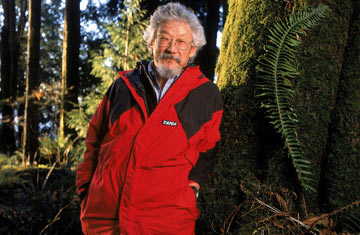
In 2004, Canada's national broadcaster, the CBC, asked Canadians to rate their greatest countrymen. David Suzuki only came in fifth — but everyone ahead of him on the list was dead. Suzuki is very much alive; indeed, his remarkable career has been a celebration of life in all its diversity, and a crusade to protect it.
Born in British Columbia's Japanese-Canadian community, Suzuki was interned with his family as a young boy during World War II. Unjust, yes, but the camp was in beautiful territory, which Suzuki spent his days exploring. Nature's glory and mystery imprinted early on him; he grew up to become Canada's premier young geneticist, an award-winning bench scientist who became a professor at the age of 33.
But something — perhaps, he says, the memory of the role that genetics had played in his family's persecution — made him restless with his fruit flies, and before long he'd embarked on a second career, creating nature documentaries for television and radio. The best-loved of them, a TV series called The Nature of Things, began its run in 1979 and has aired in some 50 countries around the world, making Suzukia kind of terrestrial Jacques Cousteau, responsible for introducing tens of millions to the world Out There.
Of course, it's been a rough time to have the Planet Earth for your beat. Vanishing species, melting glaciers, choking pollution — for the last few decades, it's been more like covering crime than wandering through the wildflowers. And that has given Suzuki his third and greatest role — as an unflagging and highly effective environmental champion. His training in TV hadn't turned him into a happy-speak temporizer — instead, he'd figured out that his combination of scientific understanding and plainspoken truth-telling made him trusted in a way that few others were. He was among the earliest to raise a cry about climate change, for instance, and he's never relented. Though he's now in his seventies, he toured Canada earlier this year, giving a string of speeches about the need for an international agreement on CO2 emissions.
Ecological science holds that everything is connected. If so, Suzuki has become one of the crucial hubs in the cultural ecology of our strained earth. Biologists talk about keystone species essential for the proper function of an ecosystem; Suzuki is a keystone guy.
Bill McKibben is the author of Deep Economy: The Wealth of Communities and the Durable Future